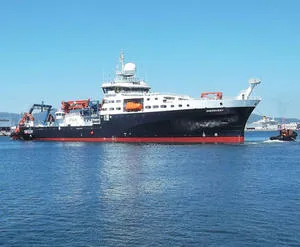
The new ship to serve the UK marine science community was today (8 July) handed over to the Natural Environment Research Council (NERC) by its builder CNP Freire, SA, in Vigo, Northern Spain.
The Royal Research Ship (RRS) Discovery represents a £75 million investment in ocean science by the Government’s Department for Business Innovation and Skills (BIS). RRS Discovery will join the RRS James Cook, previously accepted into service in 2006, and together will form one of the most modern research vessel fleets in operation anywhere in the world, maintaining the UK’s capability to work at the frontier of ocean research.
The vessel will be operated by the NERC-owned National Oceanography Centre’s (NOC) National Marine Facilities Sea Systems group, based at the Southampton Waterfront Campus. The vessel replaces the 50-year old Royal Research Ship, also named Discovery, which completed its final expedition last year.
The ship will now undertake a programme of technical trials to ensure its readiness to support the complex range of scientific activities required by the UK marine science community. The ship is expected to be ready to undertake its first science cruise in early 2014, and is then scheduled to support a series of six cruises for the Shelf Sea Biogeochemistry research programme, which is co-funded by NERC and the Department for Environment, Food & Rural Affairs (Defra), with a budget of £10.5 million. The programme directly relates to the delivery of NERC Earth system science and is aimed at reducing the uncertainty in our understanding of nutrient and carbon cycling within the shelf seas, and of their overall role in global biogeochemical cycles. The programme will also provide effective policy advice and make a significant contribution to the Living With Environmental Change programme.
At almost 100 metres in length, with a displacement of 6,075 tonnes, Discovery carries a crew of 24 and accommodation for 28 scientists and technicians. The multidisciplinary vessel has seismic capability, sub-bottom profiling and multibeam equipment, while its dynamic positioning capability allows it to support a wide range of over-the-side operations, including deployment of NERC’s Isis Remotely Operated Vehicle (ROV) which can work at depths down to 6,500 metres.
NERC’s Chief Executive, Professor Duncan Wingham, said “The RRS Discovery is an important landmark investment in maintaining the UK’s commitment to marine science of global reach and importance, and is an affirmation of NERC’s commitment to undertake science that has important societal and economic impacts, both for the UK and globally.”
RRS Discovery will be formally named on 10 October at a ceremony alongside NOC in Southampton.